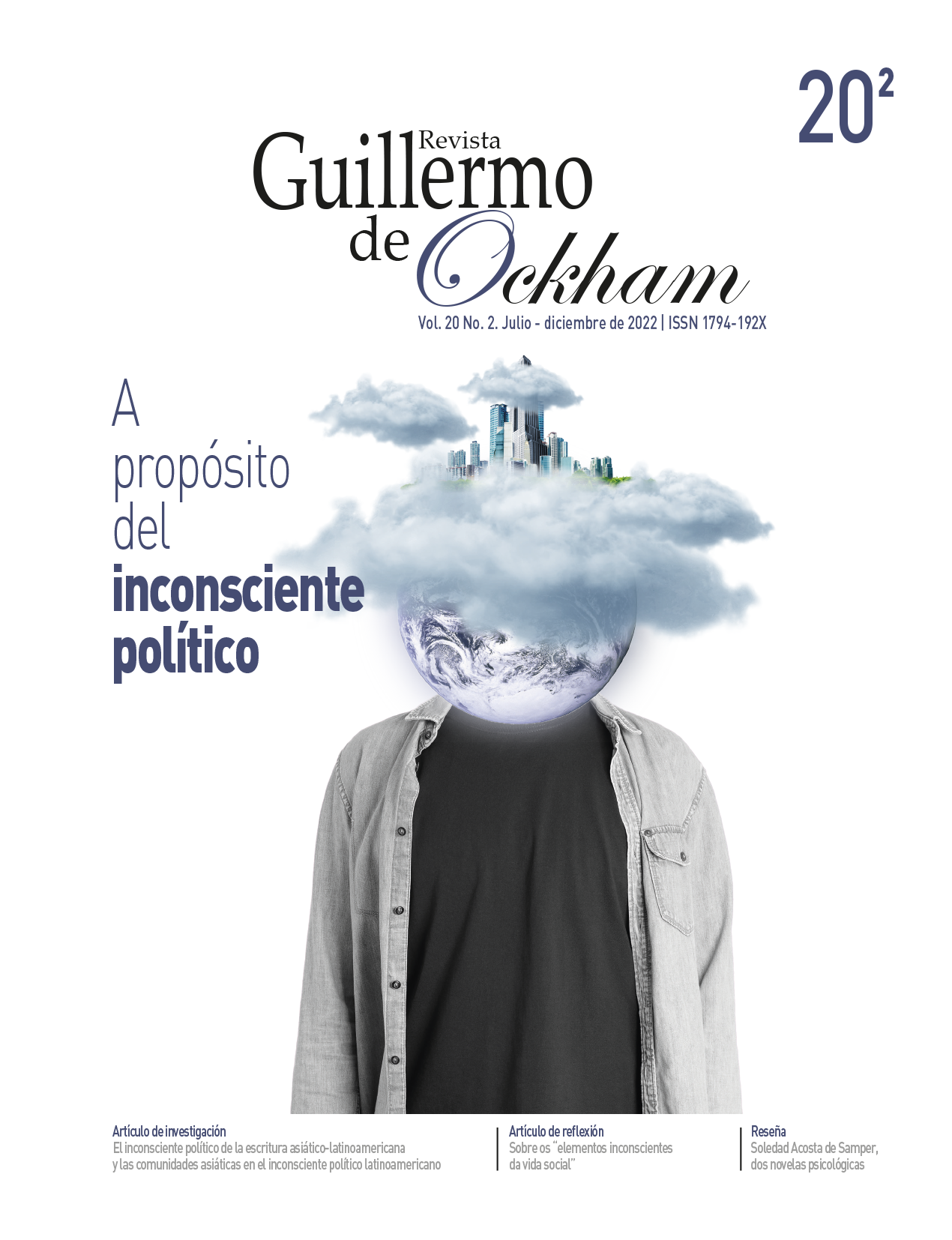The Revista Guillermo de Ockham provides an immediate and open access to its content, based on the principle of offering the public a free access to investigations to provide a global interchange of knowledge.
Unless otherwise established, the contents of this journal has a license with Creative Commons Attribution-NonCommercial-NoDerivatives 4.0 International (CC BY-NC-ND 4.0) http://creativecommons.org/licenses/by-nc-nd/4.0/
- Attribution: You must give appropriate credit, provide a link to the license, and indicate if changes were made. You may do so in any reasonable manner, but not in any way that suggests the licensor endorses you or your use.
- NonCommercial: You may not use the material for commercial purposes.
- NoDerivatives: If you remix, transform, or build upon the material, you may not distribute the modified material.
- No additional restrictions: You may not apply legal terms or technological measures that legally restrict others from doing anything the license permits.
Abstract
This article seeks to review and question the neutrality of the "Central Bank autonomy" concept. First, a historical contextualization will be made regarding autonomy, where it will be shown that even the theoretical support that fundaments it is logically inconsistent, while hiding the political element that exists behind it. Then, based on the above and in accordance with the readings offered by Ruiz Encina and Harvey, it will be shown how the conceptualization of the autonomy of monetary policy actually responds to a clear neoliberal position, while it will be shown that there are strong discrepancies between the technocratic discourse of autonomy and the real effects that can be seen in its historical sequence, emphasizing specially on inflation. In a second part, through the theoretical elaborations carried out by García Linera, this positioning will be understood as a specific edge that occurs within the general process of fetishization of the common. Finally, using categories from Žižek and Espinoza Lolas, the analysis will be framed to understand the autonomy of the Central Bank as a symptomatic expression of the ideological processes that underlie the form of the capitalist State.
Keywords:
References
Balls, E., Howat, J. & Stansbury, A. (2018). Central bank independence revisited: After the financial crisis, what should a model central bank look like? (M-RCBG Associate Working Paper Series, no. 87). https://www.hks.harvard.edu/sites/default/files/centers/mrcbg/working.papers/x87_final.pdf
Barro, R. J. & Gordon, D. B. (1983). A positive theory of monetary policy in a natural rate model. Journal of Political Economy, 91(4), pp. 589-610. https://doi.org/10.1086/261167
Bianchi, A. (2009). La autonomía del Banco Central de Chile: origen y legitimación. En: Economía Chilena, 12(3), pp. 11-23.
Blancheton, B. (2016). Central Bank independence in a historical perspective. Myth, lessons and a new model. En: Economic Modelling 52, Part A(1), pp. 101-107. http://dx.doi.org/10.1016/j.econmod.2015.02.027
Butler, J.; Laclau, E. y Žižek, S. (2003). Contingencia, hegemonía y universalidad. Fondo de Cultura Económica.
Espinoza Lolas, R. (2016). Hegel y las nuevas lógicas del mundo y del Estado. Akal.
Forder, J. (2002). Interests and independence: The European Central Bank and the theory of bureaucracy. En: International Review of Applied Economics, 16(1), pp. 51-69. https://doi.org/10.1080/02692170110109335
García Linera, A. (2015). Comunidad, socialismo y estado plurinacional. Ediciones y Publica-ciones El Buen Aire S.A.
Harvey, D. (2005). Breve historia del neoliberalismo. Akal.
Huerta González, A. (2006). La autonomía del Banco Central y la pérdida de manejo soberano de política económica. En E. Correa y A. Girón (Coords.), Reforma financiera en Amé-rica Latina. CLACSO. pp. 259-278.
Kenway, P. (1983). Marx, Keynes and the possibility of crisis. En J. Eatwell y M. Milgate (Eds.). Keynes's Economics and the theory of value and distribution. Duckworth.
Klomp, J & de Haan, J. (2010). Central bank independence and inflation revisited. En: Public Choice, 144(3-4), pp. 445-457. DOI 10.1007/s11127-010-9672-z
Lechner, N. (1983). Especificando la política. En: J. E. Vega (Coord.). Teoría y política en América Latina. CIDE. pp. 127-143.
Lechner, N. (2014). Norbert Lechner. Obras I. Estado y derecho. Fondo de Cultura Económica y FLACSO México.
Llairó, M. (2008). La argentina neoliberal. De Alfonsín a Menem. En: M. Llairó y M. Díaz (Comp.). De Alfonsín a Menem. Estado nacional y endeudamiento externo: transfor-maciones económicas políticas y sociales entre 1983 y 1993. CEINLADI. pp. 7-26.
Marx, K. (2002). El capital: el proceso de producción del capital. Siglo XXI.
Marx, K. & Engels, F. (2014). La ideología alemana. Akal.
Novelo Urdanivia, F. & Muller Durán, N. (2020). Déficit fiscal, crecimiento económico e infla-ción. ¿Una relación exógena? En: Investigación Económica, 79(312), pp. 89-112. http://dx.doi.org/10.22201/fe.01851667p.2020.312.75373
Palley, T. (2019). Central Bank Independence: a rigged debate based on false Politics and Eco-nomics. En: Investigación Económica, 78(310), pp. 67-102. http://dx.doi.org/10.22201/fe.01851667p.2019.310.71547
Pérez Caldentey, E. (2020). Un ensayo crítico sobre la independencia/autonomía de la banca central según el paradigma dominante. En: Investigación Económica, 79(311), pp. 54-82. https://doi.org/10.22201/fe.01851667p.2020.311.72436
Piva, A. (2015). La inflación argentina (2002-2013) I. En: Realidad Económica, (213), pp. 34-60.
Ruiz Encina, C. (2019). La política en el neoliberalismo. Lom.
Shull, B. (1995). Federal Reserve independence: what kind and how much? En: Journal of Post Keynesian Economics, 18(2), pp. 211-230. https://doi.org/10.1080/01603477.1995.11490069
Stiglitz, J. (2013). A revolution in monetary policy: lessons in the wake of the global financial crisis. Conmemoración C. D. Deshmukh, Mumbai, India.
Walsh, C. E. (2008). Central bank independence. En: S. Durlauf y L. E. Blume (Eds.), The New Palgrave Dictionary of Economics. Palgrave Macmillan. https://doi.org/10.1057/978-1-349-95121-5_2217-1. pp. 1-5
Žižek, S. (2001). El sublime objeto de la ideología. Siglo XXI.
Žižek, S. (2015). Menos que nada. Akal.

































